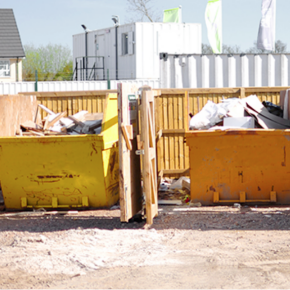
Reconomy reveals waste-saving tips
Reconomy has outlined ways to safeguard your profit margins against the plummeting pound and increased materials and construction waste costs.
Brexit is currently having an adverse affect on sterling’s value and according to the Federation of Master Builders’ State of Trade Survey for Q2 2016, the situation won’t stabilise anytime soon. 65% of firms expect material costs to increase over the next six months, likely increasing construction waste costs.
Building site managers are looking to counteract this by making savings across all on-site operations, including waste management. This is no easy task though, when you consider the UK construction sector is the country’s largest consumer of natural resources, using 400 million tonnes of materials while producing 100 million tonnes of waste and disposing of 25 million tonnes of it in landfills.
Effective management of construction waste costs will enable progressive managers to focus on reducing, reusing, recycling and efficiently disposing of waste.
Minimise Landfill Costs
Sending large volumes of waste to landfill is becoming costly with Landfill Tax and disposal charges increasing every year. Therefore, advanced planning for materials required for the build can reduce the risk of over-ordering in addition to using off-cuts before ordering any new materials to minimise waste.
Segregate Waste Efficiently
Segregating waste efficiently is essential for effective construction waste costs management. Introducing a secure on-site waste storage area that features clearly labelled and colour-coded skips, bulk bags or wheelie bins for different types of waste and if applicable, deploy a mini crusher and screener for leftover bricks, blocks and hardcore.
In addition, a team that exclusively monitors and manages materials and waste either full or part time can be beneficial.
Maximise the potential of waste
Decide which materials can be recycled or resold and choose recycled materials for your projects, offering the same quality as new materials but at lower unit costs. In addition, you can send mixed waste skips to a Materials Recovery Facility, and if employing waste contractors, choose the one that offers high but verifiable waste recovery rates.
Re-use existing materials
Reusing or repurposing existing materials once they’ve been stripped out can reduce the need for costly new materials. You could also collaborate with other businesses and trades to identify potential opportunities for exchanging waste-reusable materials and repair damaged materials.
Work with the right suppliers
You should aim to work with suppliers that offer take-back schemes that enable you to sell/send back excess materials including packaging and allow for staggered deliveries, reducing the need for managing costly on-site storage areas and submit fully-audited reports on your waste streams. They should also ensure that your waste forecasts are based on the most relevant and up-to-date data.
Research has shown that effective waste management can lead to landfill diversion rates of up to 95%. Dealing with construction waste costs enable businesses to protect profit margins and enjoy a competitive edge over rivals.
Latest news

25th April 2024
BMBI: Value sales in first two months were -3.4% down
The latest Builders Merchant Building Index (BMBI) report shows builders’ merchants’ value sales were down -4.7% in February compared to the same month a year ago.
Posted in Articles, Bathrooms & Toilets, Bathrooms, Bedrooms & Washrooms, Bricks & Blocks, Building Associations & Institutes, Building Industry News, Building Products & Structures, Building Services, Civil Engineering, Concrete, Cement, Admixtures, Drainage, Floors, Hard Landscaping & Walkways, Interior Design & Construction, Interiors, Landscaping, news, Paints, Paints, Coatings & Finishes, Plant, Equipment and Hire, Plumbing, Posts, Publications, Research & Materials Testing, Restoration & Refurbishment, Retrofit & Renovation, Sustainability & Energy Efficiency
24th April 2024
The lowdown on Origin’s New Soho Offering
Origin’s Soho External Door is the first launch in its new generation of products, setting a higher standard for the fenestration industry.
Posted in Access Control & Door Entry Systems, Aluminium Products, Architectural Ironmongery, Articles, Building Industry News, Building Products & Structures, Building Systems, Doors, Innovations & New Products, Posts, Restoration & Refurbishment, Retrofit & Renovation, Security and Fire Protection
24th April 2024
Mitsubishi Electric welcomes new code of conduct for smart appliances
Mitsubishi Electric welcomes a new code of conduct on energy smart appliances which the European Union (EU) announced yesterday at the Hannover Fair in Germany.
Posted in Air Conditioning, Articles, Building Industry Events, Building Industry News, Building Products & Structures, Building Regulations & Accreditations, Building Services, Exhibitions and Conferences, Facility Management & Building Services, Heating Systems, Controls and Management, Heating, Ventilation and Air Conditioning - HVAC, Plumbing, Retrofit & Renovation, Seminars, Sustainability & Energy Efficiency
24th April 2024
Hamworthy Heating expands CIBSE approved CPD modules with new hot water series
Hamworthy Heating, technical experts in commercial heating and hot water products, announce the expansion of its market leading CIBSE approved Continuing Professional Development (CPD) portfolio with the launch of three new learning modules.
Posted in Articles, Building Industry Events, Building Industry News, Building Products & Structures, Building Services, Continuing Professional Development (CPD's), Facility Management & Building Services, Heating Systems, Controls and Management, Heating, Ventilation and Air Conditioning - HVAC, Plumbing, Retrofit & Renovation, Seminars, Training
 Sign up:
Sign up: